Patellar tendon bandage
introduction
The patellar tendon bandage is a narrow bandage that covers the upper lower leg, just below the knee.
At this point, the insertion of the patellar tendon is located on a bulge on the upper edge of the tibia.
The tendon stretches around the knee and performs important tasks in extending the knee.
The kneecap, the so-called "patella", is located within the patellar tendon and serves to deflect the tendon fibers.
The muscle that moves the tendon is the powerful quadriceps muscle of the thigh.
Without it, knee extensions and movement sequences are almost impossible.
The patellar tendon bandage exerts pressure on the tendon at its base and can thus partially relieve it.
For many people, the spot is a painful problem area that can be significantly alleviated by a bandage in everyday life.

These are the indications
The patellar tendon bandage has a therapeutic and a preventive component.
Many sports are accompanied by strain on the leg extensor muscles, for example through long-lasting monotonous loads such as jogging or through rapid braking and acceleration in many ball sports.
The tendon can rub against the bone below the knee and become a problem area due to the constant stress.
The tendon fibers are irritated and can easily become inflamed.
The tendon can be used for anterior knee pain, cartilage damage to the kneecap, tendinitis or so-called "patellar tip syndrome".
Together with a reduction in exercise, the patellar tendon bandage can provide the necessary relief and promote the healing of the irritation.
The bandage can also be used preventively in the event of expected complaints, for example in high-performance sport or in the event of anterior knee pain that has already occurred.
How does the patellar tendon bandage work?
The bandage is very narrow and anatomically adapted so that it can be attached directly to the transition from the tibia to the knee joint.
It presses on the patellar tendon and the kneecap from below and thus specifically relieves the tendons, bone attachments, the kneecap and the cartilage structures in the front knee.
At the same time, it increases the stability in the knee joint and also counteracts movement restrictions.
On the inside of the patellar tendon bandage there are knobs that can exert pressure on individual points.
When moving, they massage the tendons and muscles in the lower knee joint.
The heat that forms under the bandage can also reduce inflammation and tendon irritation more quickly.
The patellar tendon bandage is also used preventively in sport.
The slight pressure on the knee joint can lead to movements being carried out more consciously and carefully, thereby increasing stabilization in the joint and reducing injuries.

I would be happy to advise you!
Who am I?
My name is dr. Nicolas Gumpert. I am a specialist in orthopedics and the founder of .
Various television programs and print media report regularly about my work. On HR television you can see me every 6 weeks live on "Hallo Hessen".
But now enough is indicated ;-)
The knee joint is one of the joints with the greatest stress.
Therefore, the treatment of the knee joint (e.g. meniscus tear, cartilage damage, cruciate ligament damage, runner's knee, etc.) requires a lot of experience.
I treat a wide variety of knee diseases in a conservative way.
The aim of any treatment is treatment without surgery.
Which therapy achieves the best results in the long term can only be determined after looking at all of the information (Examination, X-ray, ultrasound, MRI, etc.) be assessed.
You can find me in:
- Lumedis - your orthopedic surgeon
Kaiserstrasse 14
60311 Frankfurt am Main
Directly to the online appointment arrangement
Unfortunately, it is currently only possible to make an appointment with private health insurers. I hope for your understanding!
Further information about myself can be found at Dr. Nicolas Gumpert
How do you put them on correctly?
The patellar tendon bandage consists of a wider front part that is padded and has small knobs on the inside.
This part of the bandage is the functional part that rests directly on the front of the tibia and the kneecap.
The knobs are aimed at the skin. On one side the bandage has a slight crescent-shaped notch that comes to lie around the lower area of the kneecap.
It hugs the kneecap and can exert a slight pressure from below, thus relieving the kneecap cartilage in particular.
The patellar tendon bandage is attached to the back of the lower leg with a narrow strap that is pulled through a loop and can be attached with a Velcro fastener.
Despite the tight fit, the bandage should be comfortable to wear and provide light massages on the front when moving.
Use in Osgood-Schlatter's disease
Osgood-Schlatter's disease is a disease that occurs mainly in athletes.
Here, too, there is irritation of the insertion of the patellar tendon, whereupon parts of the tibial head die off.
This so-called "necrosis" of pieces of bone in the shin occurs primarily through excessive exercise.
Typically, the disease occurs primarily in children and adolescents.
The main symptom of Osgood-Schlatter's disease is a typical pain in the head of the tibia after physical activity.
The primary therapy consists of protecting the knee and initially refraining from sporting activities and movements that trigger it.
The patellar tendon bandage can specifically support this healing process and relieve the symptoms by applying light pressure on the affected area.
If the disease is developing or it already existed on the other leg, the support can be worn preventively during sport.
Use in patellar tip syndrome
The patellar tip syndrome describes the inflammation and pathological changes in the patellar tendon at the lower pole of the kneecap.
Pain syndromes of the patellar tendon are very typical in athletes and can be triggered by acute or long-term monotonous movements.
The disease is also known as "Jumper’s Knee", as the rapid and frequent extension of the knee can greatly promote the syndrome.
The pain usually announces itself during exercise.
If this has already occurred several times or if it occurs regularly during exercise, certain activities must be carried out more carefully in order to protect the knee.
The patellar tendon brace can help to move more consciously and at the same time to relieve the tendon.
This allows the irritation to heal quickly.
In the future, the bandage can be worn preventively during sport in order to prevent new complaints.
Use in case of patellar tendon irritation
In many cases, irritation of the patellar tendon is synonymous with patellar tendon syndrome.
However, it is a kind of preliminary stage.
The irritation leads to recurring pain under the kneecap, especially during sport.
The patellar tendon bandage is particularly helpful in these cases, as it relieves the tendon, relieves irritation in the long term, improves symptoms and strengthens self-awareness so that stressful activities are performed less often.
For this reason, the patellar tendon bandage is often used preventively in professional sports.
What is the Kasseler knee support?
The Kasseler knee bandage is a bandage to promote the so-called "proprioception".
This means a form of sensitivity and body awareness that perceives states of movement, changes in movement and muscle activities in the body.
This proprioception can be increased by applying light pressure below the kneecap, so that one's own movements are more clearly perceived and executed more consciously.
In this way, injuries can be prevented, especially in sports, but complaints can also be treated.
The Kasseler knee brace achieves this effect by providing a permanent light pressure with numerous knobs and a massage function when moving.




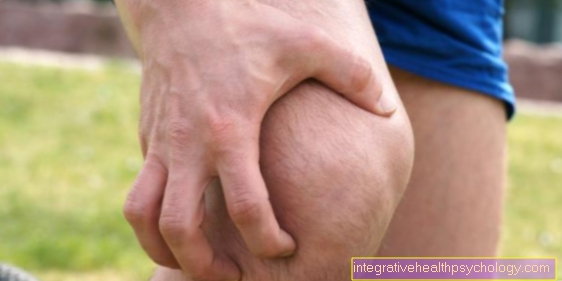

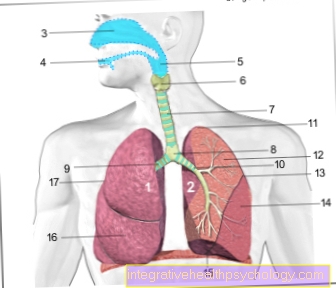



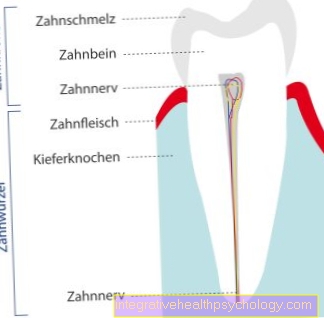
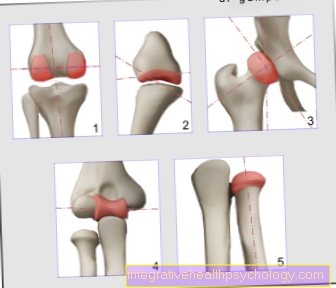
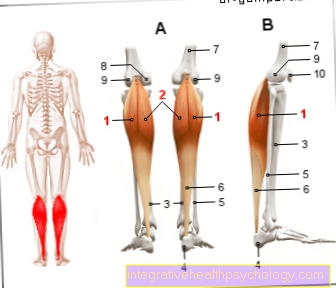


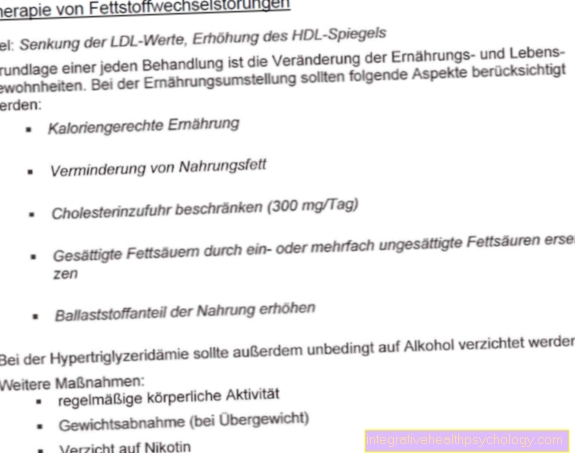



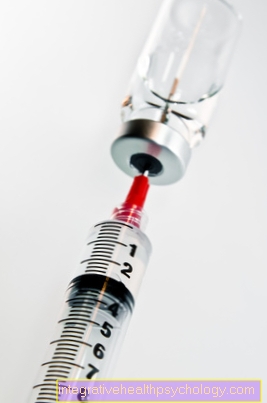

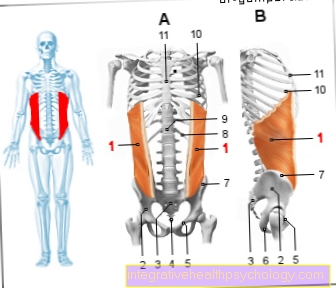




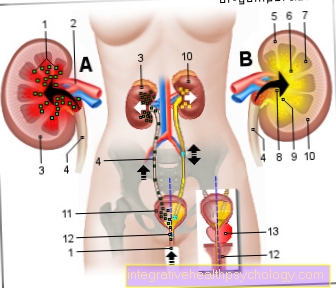


.jpg)